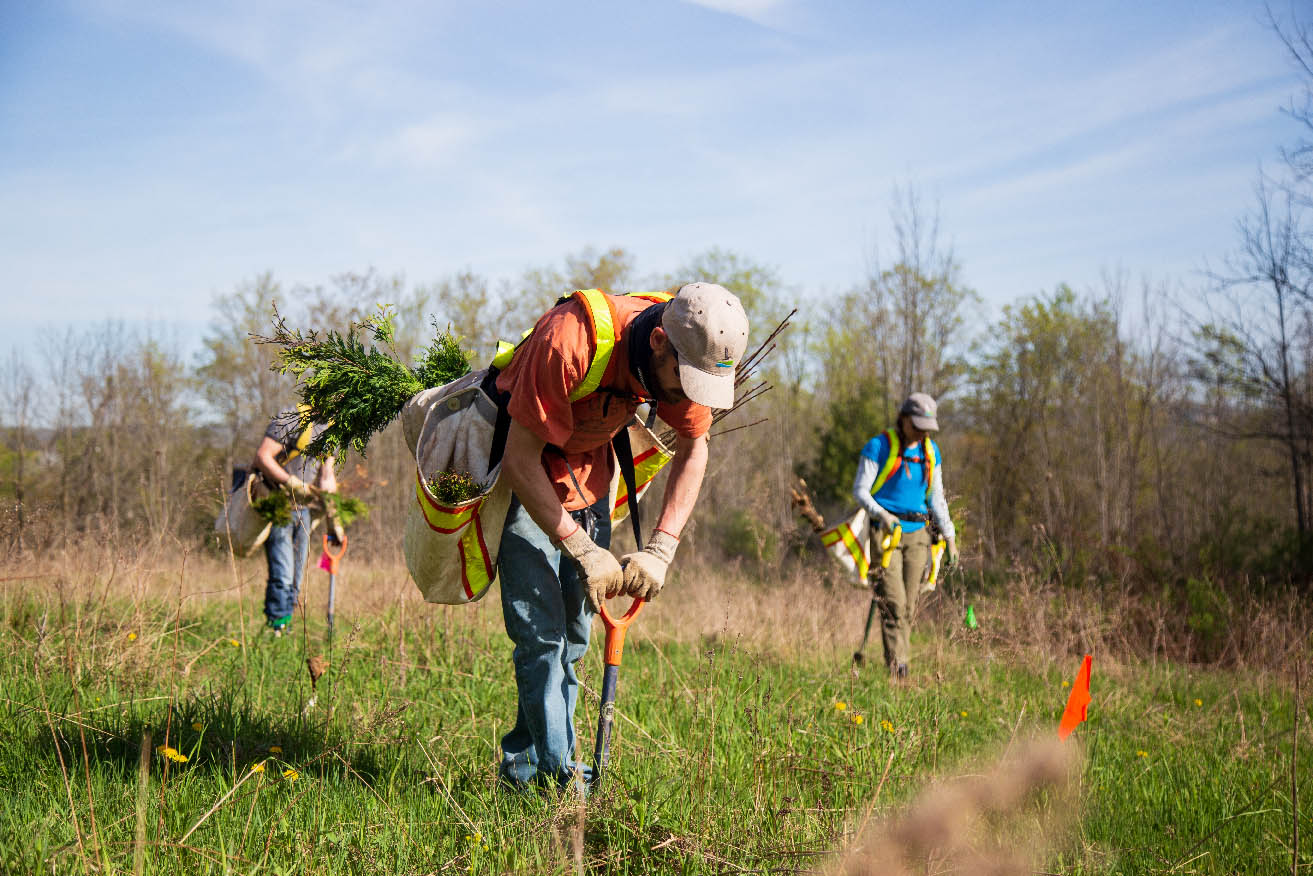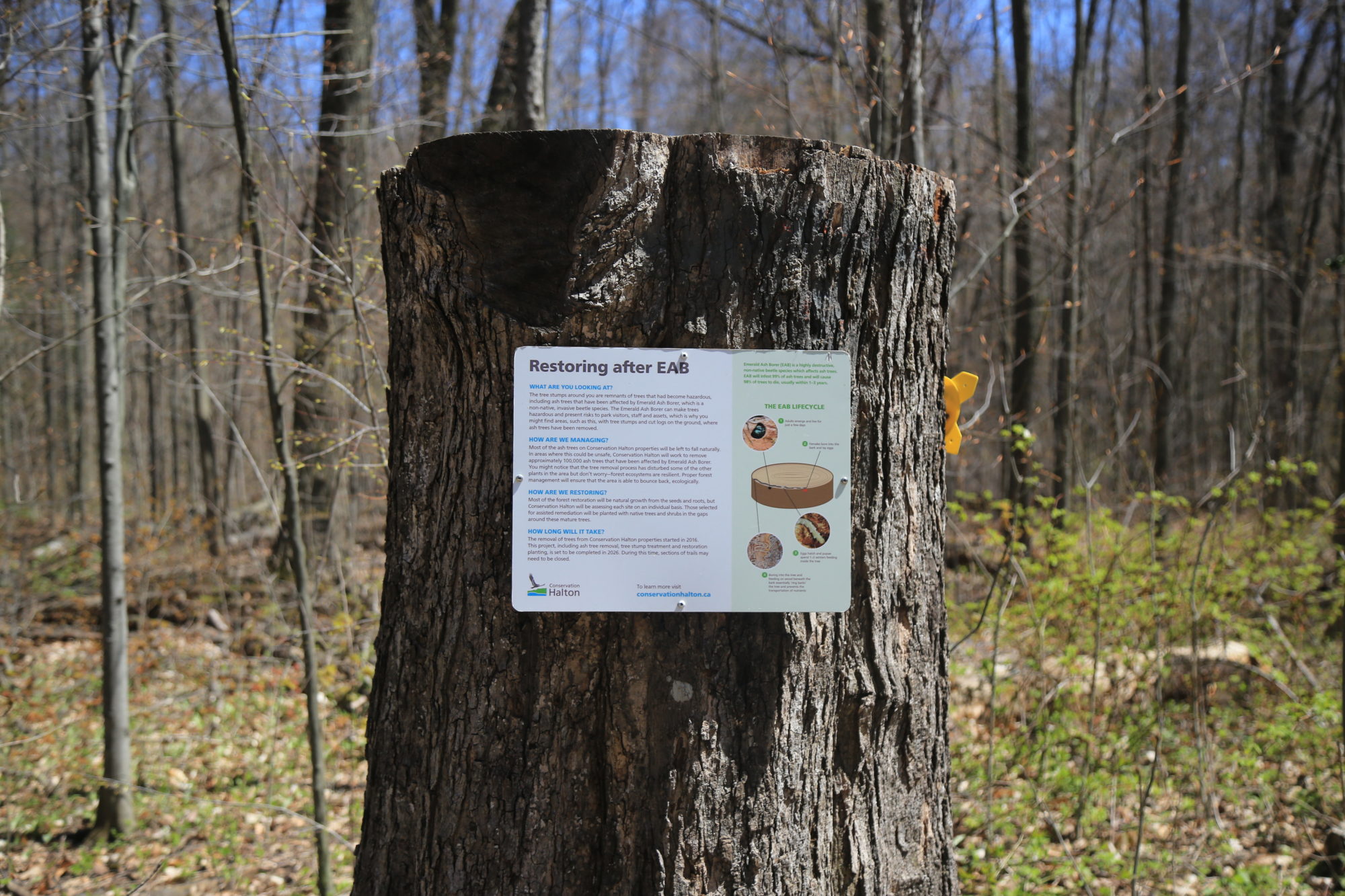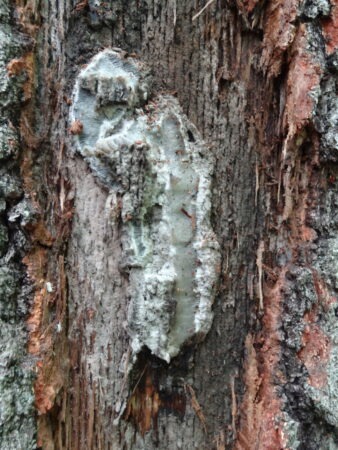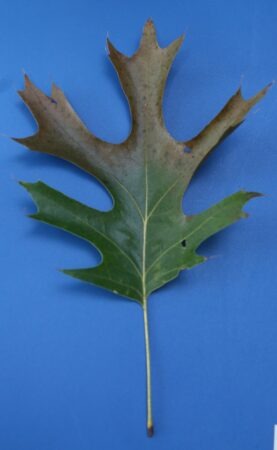Conservation Halton owns and manages more than 10,500 acres throughout our watershed, most of which is forested. These forests provide important economic ecological and recreational services for the people in our communities and the wildlife that live in these habitats.
The forestry team at Conservation Halton works to create and support healthy forest ecosystems through sustainable forest management, forest health monitoring and tree planting (known as “afforestation”) programs. As a result, this work increases water, air and soil quality, reduces erosion, provides wildlife habitat and improves habitat connectivity.

Tree planting is one of the primary forestry programs at Conservation Halton. Over the past 60 years, we have planted more than 4 million trees on our own lands and on other private and public properties. Each year, the forestry department plants around 50,000 trees and shrubs on both private and public lands, in an effort to reach their goal of 30 percent forest cover in the watershed.
Conservation Halton is looking for landowners interested in planting trees on their properties, and there are a number of funding opportunities that can help offset the costs.
Program requirements:
- Minimum 500 trees to be planted
- Minimum 0.5 acres of open land that can be planted
- Property is located within the Conservation Halton watershed
- Willing to protect the trees from livestock, wildlife, and machinery damage
- Able to cover the remaining costs of the tree planting after subsidies
- Eligible project types include afforestation, riparian, windbreak, and restoration
- Willing to sign a 15-year agreement stating you will not cut, harvest, or otherwise remove the trees from the planted area for a minimum of 15 years after planting
Forestry staff will conduct a (free) site visit to discuss your project objectives, create a plan that is designed for your property and support you in accessing funding program. Staff will manage the process of planting the trees, and monitoring will be carried out at years one, two and five.
If you are interested in tree planting, and your property meets the requirements, please complete and submit an application form.
The Conservation Halton Strategic Forest Management Plan, which will guide us as a leader in sustainable forest management for next 20 years, includes:
- Landscape-approach to forest management with a focus on landscape-based management of our forests
- Commitment to sustainable management practices by identifying forest health as the primary outcome
- Key pressures and challenges that our forests are faced with and what we can do to address them
- Accountability in sustainable forest management with annual performance indicators built into the plan
The Strategic Forest Management Plan will be delivered with a five-year outlook and a focus on three objectives:
- Improve forest health conditions using current and future accepted methodologies and science
- Maximize the value of our forests in delivering environmental goods and services, social and health benefits, and enhanced forest diversity
- Maintain and, where possible, increase forest cover across our watershed through afforestation of private, municipal, and corporate lands, and through public education and landowner outreach programs.
The Managed Forest Tax Incentive Program is available to landowners who own four hectares (9.88 acres) or more of land that is forested, and agree to prepare and follow a Forest Management Plan for their property. Under this program, landowners have the forested part of their property assessed and classified as “Managed Forest” and taxed at 25 percent of the municipal tax rate for residential properties.
Conservation Halton can assist landowners in compiling and submitting a Forest Management Plan based on forestry practices and landowner objectives. Costs associated with participation in this program can be reduced by funding opportunities through the Region of Halton.
Check your eligibility for the MFTIP program. Forestry staff can help you prepare a Managed Forest Plan.
For more information about the Managed Forest Tax Incentive Program, please visit the Ministry of Natural Resources and Forestry or contact our Managed Forest Plan Approvers by emailing us at forestry@hrca.on.ca
Emerald Ash Borer is an invasive beetle that is known to be damaging and destructive to Ash trees. Once an tree has been infested with Emerald Ash Borer, it is usually killed within two or three years, and becomes more susceptible to falling over or dropping branches. Dead trees can provide many ecological benefits to a forest, but unfortunately, they can also be dangerous and hazardous if the tree is within striking distance of a trail, road, hydro, building or other assets.
As a result of this risk, Conservation Halton is in the process of removing around 100,000 trees infested with Emerald Ash Borer from our properties, so that they don’t hurt anyone or damage anything. In order for us to remove these trees, safely, we sometimes need to close trails, so we appreciate your patience, understanding and respect. In these cases, signs will be posted in the areas where work is taking place, and service disruptions will be shared on our website.
Restoration

In areas where a large number of trees need to be removed, the tree canopy will be more open, the forest will appear emptier, and there may be many logs on the ground. It won’t be pretty, but after a year of natural restoration, the area will look like a healthy, young forest again. Most restoration occurs from the seeds and roots of existing trees, but we will be supporting this restoration with new trees and shrubs planted in the area.
Prevention
The forestry team at Conservation Halton would like to remind you to not transport firewood from one area to another, as this is a common way that Emerald Ash Borer is spread. Transporting firewood might not seem like a big deal but it could lead to a infestation, which can impact the value of your property and limit your ability to enjoy the environment around you. Help protect our trees and “buy it where you burn it!”


Oak wilt is a fungal pathogen that has been confirmed at two locations in Ontario, making it the first known cases of the disease in Canada. Red oaks are very susceptible, and tree death can occur within a single season.
The fungal disease grows on the outer sapwood and moves through the vascular system of the tree, slowly restricting the flow of water and nutrients. The fungal spores are spread by small nitidulid beetles that feed on sap from fresh wounds and carry the disease from infected trees to uninfected trees. As the beetles feed on sap, the fungus moves into the vascular tissue and the tree reacts by walling off the spread of the disease, plugging cells. This response is what causes branches to wilt. Another method of spread is through interconnected root systems (root grafts) between infected and healthy oak trees allowing the disease to spread within a stand.
The most noticeable symptoms are sudden wilting and premature dropping of leaves in mid-summer. Leaves at the edge of the canopy are usually the first to wilt, with this wilting progressing toward the inner canopy.
The signs of oak wilt are:
• Dull green, brown or bronzing of the leaves
• Premature leaf drop
• Vertical cracks on the trunk from pressure pads that emit a fruity smell
• White, grey or black fungus
What can you do?
• Don’t prune oak trees between April and November
• Do NOT move firewood
• Report suspected signs to the CFIA
• Check oak trees for signs and symptoms of oak wilt
For more information or to report oak wilt, click here.
If you have a forest property, Conservation Halton offers free visits for landowners to learn more about your forest, find out how to improve the quality of your forest, and get information about government programs to save a percentage of your property taxes. Contact us as treeplanting@hrca.on.ca for more information.